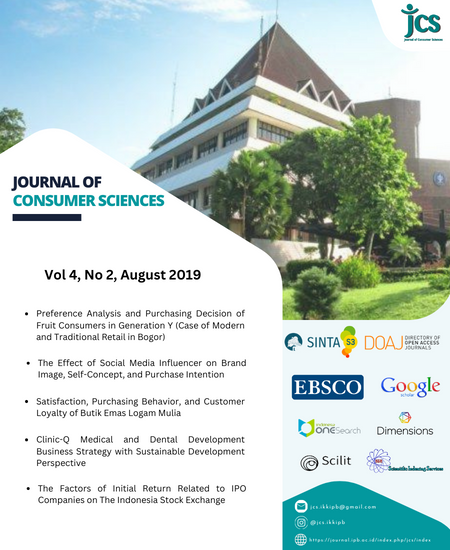The Factors of Initial Return Related to IPO Companies on The Indonesia Stock Exchange
Abstract
Companies that conduct IPOs will increase company’s value with an optimal capital structure. Initial return is a profit that investors can obtain from the initial share price is lower than the opening price of the secondary shares on the first day. Underpricing conditions occurs because the initial stock price is lower than the secondary stock price on the first day. This study aimed to analyze factors that impact initial returns on companies that conduct IPOs on the Indonesia Stock Exchange, analyze the effects of financial factors (ROE, DER, and BI Rate) and non-financial factors (professional auditors and underwriters) on initial returns to companies conducting IPOs in IDX, and how the behavior of investors towards those analysis. The linear regression data processing using SPSS 16 produced result that only the BI Rate variable which affected the initial return on the seven days, 30 days, and one year after the IPO observation period. The statistical results show the best r-square value is 17.6 percent, which means that the independent variables can be used to explain the effect to the initial return on 17.6 percent.
References
Azhari, D.F., Rahayu, S.M., Zaharoh, Z.A. (2016). Pengaruh ROE, DER, TATO, dan PER terhadap harga saham perusahaan properti dan real estate yang go public di Bursa Efek Indonesia. Jurnal Administrasi Bisnis, 32.
Benigno, A.M. (2016). Relationships Between Interest Rate Changes and Stock Returns: International Evidence Using A Quantile-On-Quantile Approach. Universidad Complutense de Madrid, Madrid.
Emilia LS, Roy S. (2008). Faktor-Faktor yang Mempengaruhi Initial Return 1 Hari, 1 Bulan, dan Pengaruh Terhadap Return 1 Tahun Setelah IPO. Journal of Applied Finance and accounting. 1(1).
Field, L.C., Dennis, P.S., (2004). IPO Underpricing and Outside Blockholdings. SSRN Electronic Journal, 10(2) .
Graham, J.R., Harvey, C.R. (2001). The heory and practice of corporate finance: evidence from the field. Journal of Financial Economics, 60(2), 187-243.
Gumanti, T.A., Alkaf, N. (2011). Underpricing dalam Penawaran Saham Perdana dan Penawaran Saham Susulan. Jurnal Akuntansi dan Keuangan Indonesia, 8(1).
Hanafi, M., Abdul, H. (2000). Analisis Laporan Keuangan. Yogyakarta: UPP AMP YKPN.
Hartono, J. (2013). Teori Portofolio dan Analisis Investasi. Yogyakarta: BPFE
Junaeni I., Rendi, A. (2013). Analisis Faktor-faktor yang mempengaruhi Tingkat Underpricing Saham pada Perusahaan yang melakukan Initial Public Offering di BEI. Jurnal Ilmiah WIDYA, 1(1).
Kewal, SS. (2012). Pengaruh Inflasi, suku Bunga, Kurs, dan Pertumbuhan PDB terhadap Indeks Harga Saham Gabungan. Jurnal Economia, 8(1), 53-64.
Li, M., Steven X.Z., Melissa, V.M. (2005). Underpricing, Share Retention, and The IPO Aftermarket Liquidity. International Journal of Managerial Finance, 1(2).
Pompian, Michael, M. (2006). Behavioral Finance and Wealth Management. New York: John Wiley & Sons, Inc.
Ratnasari, A., Gunasti, H. (2013). Analisis Pengaruh Informasi Keuangan, Non Keuangan serta Ekonomi Makro terhadap Underpricing pada Perusahaan ketika IPO. Jurnal Buletin Studi Ekonomi, 18.
Risqi, I.A., Puji, H. (2013). Analisis Faktor-faktor yang mempengaruhi Underpricing ketika Initial Public Offering (IPO) di Bursa Efek Indonesia . Diponegoro Journal of Accounting, 2(3).
Ritter, J.R.,Welch, I. (2002). A review of IPO activity, pricing and allocations. The Journal Of Finance, 57(4).
Samsul, Mohammad. (2006). Pasar Modal dan Manajemen Portopolio. Jakarta: Erlangga.
Sawir, Agnes. (2009). Analisa Kinerja Keuangan dan Perencanaan Keuangan Perusahaan. . Jakarta(ID): PT. Gramedia Pustaka Utama
Usman, Marzuki. (1990). ABC Pasar Modal Indonesia. Jakarta(ID): Ikatan Sarjana Ekonomi Indonesia.
Ritter, J.R., Welch, I. (2002). A review of IPO activity, pricing and allocations. The Journal Of Finance, 57(4).
Authors
Authors who publish with this journal agree to the following terms:
- Authors retain copyright and grant the journal right of first publication with the work simultaneously licensed under a

This work is licensed under a Creative Commons Attribution 4.0 International License. that allows others to share the work with an acknowledgement of the work's authorship and initial publication in this journal. - Authors are able to enter into separate, additional contractual arrangements for the non-exclusive distribution of the journal's published version of the work (e.g., post it to an institutional repository or publish it in a book), with an acknowledgement of its initial publication in this journal.
- Authors are permitted and encouraged to post their work online (e.g., in institutional repositories or on their website) prior to and during the submission process, as it can lead to productive exchanges, as well as earlier and greater citation of published work (See The Effect of Open Access).







